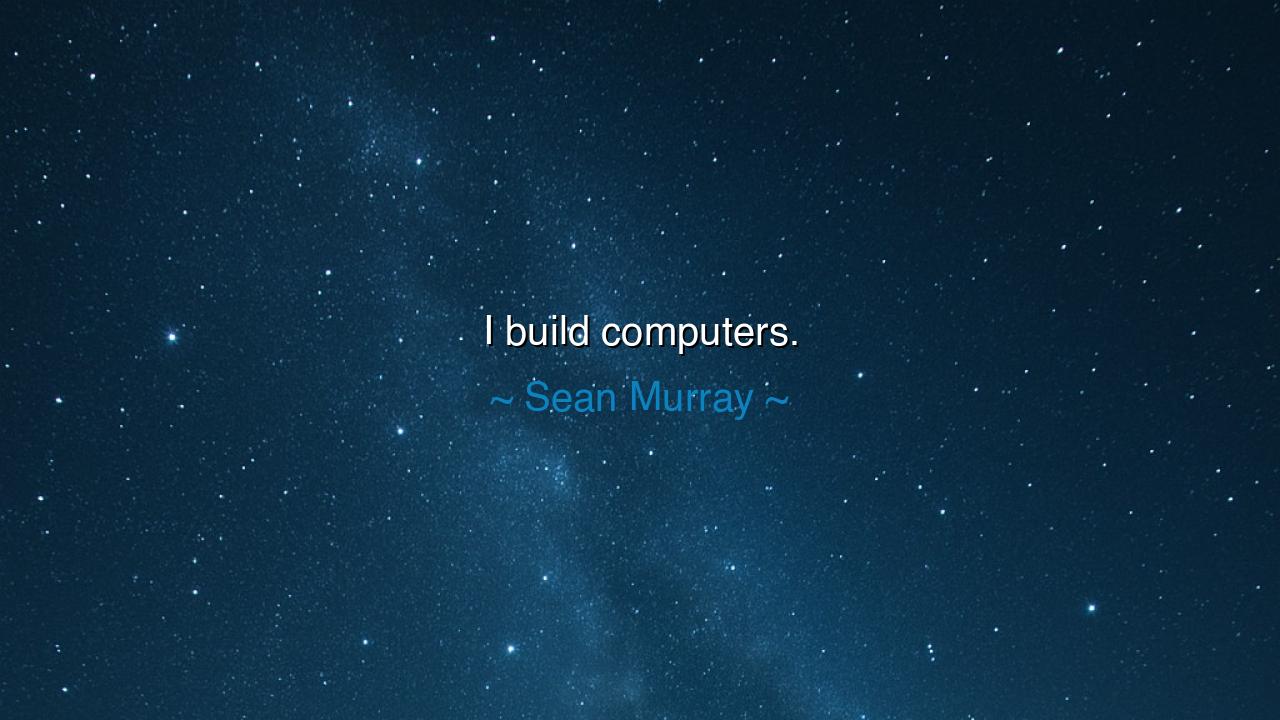
I build computers.






The words of Sean Murray—“I build computers”—are humble in sound, yet vast in meaning. Within this simple statement lies the ancient spirit of creation, the eternal human desire to craft, assemble, and breathe life into matter. It is the same voice that once said, “I forge swords,” or “I carve temples from stone.” Murray’s declaration is not merely about constructing machines—it is about shaping the modern world with one’s own hands, about standing as both artisan and architect in an age of circuits and code. In this phrase, the soul of the craftsman meets the power of the divine creator, for to build is to bring order to chaos, and to build computers is to give form to thought itself.
When Sean Murray—creator of No Man’s Sky, a universe of infinite digital worlds—spoke these words, he revealed more than his profession; he revealed his philosophy. In an era when technology often feels cold and impersonal, Murray’s approach was deeply personal, almost spiritual. To him, building computers was not about machines—it was about imagination and possibility. Like the sculptors of ancient Athens who believed marble contained a sleeping god waiting to be revealed, Murray saw in the blank circuit board the potential for creation, for worlds unseen. His simple statement is a whisper from the modern Prometheus, one who steals the fire of intelligence and places it into silicon.
This truth stretches back to the dawn of human craftsmanship. The ancient builders of the pyramids, the engineers of Rome, the craftsmen of the Renaissance—all shared the same spirit. They labored not merely to make, but to understand through making. Their creations were extensions of their minds, their dreams made visible. So too does the modern builder of computers participate in this lineage. When Murray builds, he joins that unbroken chain of makers who sought to harness the elements—stone, bronze, electricity, now information itself—to serve the advancement of humankind.
Yet, there is humility in his tone, and therein lies its power. For Murray does not claim, “I invent universes,” though he has done so. He does not boast of programming genius or creative mastery. He says only, “I build computers.” This simplicity is the mark of true wisdom. The wise man does not exalt himself; he honors his craft. In the old world, the potter did not claim to create art but to serve the clay, to listen to its shape. So too does Murray speak like a monk of the digital age, aware that the act of building—of connecting wires, testing circuits, solving errors—is a sacred discipline, a meditation in motion.
There is also a profound lesson about agency in these words. In an age where most are content to consume technology, Murray reminds us that we can create it. Many worship the machine as if it were born of mystery, forgetting that every chip, every line of code, was once shaped by human hands. To say “I build computers” is to reclaim dominion over technology—to declare that we are its masters, not its slaves. The ancients built their tools to conquer the wilderness; we build ours to explore the digital frontier. The act of building is, and always has been, an act of freedom.
Consider, for example, the story of Alan Turing, who built the first great computer not to serve wealth or power, but to liberate truth. In a time of war, he created a machine that could think, that could solve what men alone could not. From his courage came the dawn of the modern age—a single mind, building in obscurity, altering the course of civilization. Sean Murray’s humble craft echoes Turing’s legacy: that through creation, through patient building, one can touch the infinite.
Thus, my children, remember this: to build—whether of stone, code, or dream—is to become part of the eternal dialogue between man and creation. Do not shrink from the act of making. Take up your tools, your hands, your hearts, and forge something real. For in a world that hungers for consumption, the builder is a prophet, the craftsman a poet, the coder a philosopher.
And so, when you hear the words “I build computers,” hear also their ancient echo: “I shape worlds.” For every builder, in every age, is bound by the same sacred calling—to bring the unseen into being, to give form to thought, and to remind mankind that the power of creation, however modern its form, remains forever divine.






AAdministratorAdministrator
Welcome, honored guests. Please leave a comment, we will respond soon